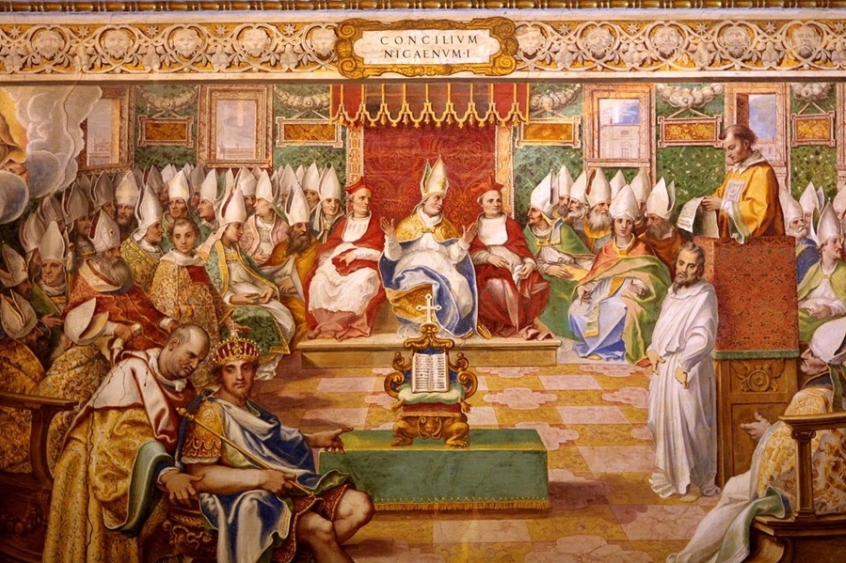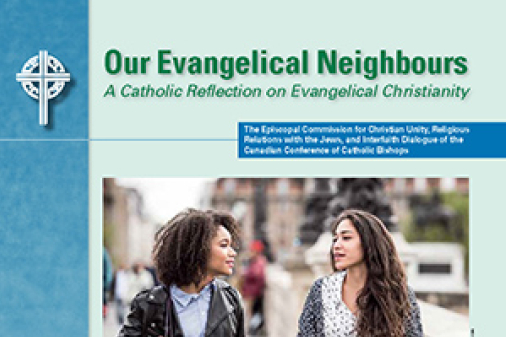It's the year leading up to the 500th anniversary of the Reformation. Pope Francis shared a service with Swedish Lutherans. Roman Catholics and Lutherans have decided they agree on the fundamental point that led to the Reformation in the first place, the doctrine of justification. Some have said the Reformation is effectively over; cooler heads have pointed out that it isn't, for two reasons: Lutherans at any rate have gone down a very liberal path in terms of women priests and human sexuality, and Catholics have remained, well, Catholics, in terms of their devotion to Mary and views on the eucharist and Church authority, among much else. There's no formal reunion on the cards any time soon.

Evangelicals are heirs to the Reformation, but they aren't generally Lutherans (though the Lutheran Church in Germany is called the Evangelical Church). So how do evangelicals and Catholics relate to each other? Hostility and mutual incomprehension have long been the hallmarks of their perceptions.
A new resource from the Canadian Conference of Catholic Bishops hopes to change that. Our Evangelical Neighbours – A Catholic Reflection on Evangelical Christianity offers evangelicals to see themselves through Catholic eyes. It's been shaped by a six-year dialogue between Roman Catholics and evangelicals from the Evangelical Fellowship of Canada, with six scholars from each camp. It's been commended by the EFC, whose president Bruce Clemenger said it "offers a clear overview of Evangelical beliefs and practices" and that "most evangelicals in Canada would find themselves fairly represented in its pages".

Given the vitriol each has hurled at the other over the years this is a remarkable achievement. The document ought to be widely read, and not just in Canada; it's a considerable contribution to evangelical/Catholic understanding.
The booklet acknowledges Catholics can feel hurt by evangelicals who doubt their Christianity. But it is generous towards them, also acknowledging their lively worship music, sense of congregational community and enthusiasm about the faith. It also notes evangelicalism's growth around the world, particularly in traditionally Catholic Latin America.
It gives a brief and accurate history of the movement, beginning with the Puritans and Calvinism, going on to North American Revivalism and fundamentalism – not the same as evangelicalism, but "part of the heritage". Fundamentalism rejects scientific accounts of origins and the age of the universe, and is rather preoccupied with the End Times. But they are given credit for defending essential doctrines like the Virgin Birth and the Resurrection.
It stresses that "Both Catholics and Evangelicals can say the Nicene Creed without crossing their fingers" and are orthodox in dogma. But it talks about evangelical essentials like salvation by faith, the centrality of the cross and evangelism. It notes they have little denominational loyalty.
Catholics, it says, "find much in evangelicalism that is attractive", including evangelicals' devotion to Scripture, personal relationship with Christ and moral standards. But, it goes on: "Nevertheless, Catholics do have concerns about several matters of faith and practice in Evangelical communities. Many think that Evangelicals read the Bible too literally. When the legitimate findings of science and the claims of Christian faith seem to conflict, or when the end of the world becomes an unhealthy preoccupation, Catholics are convinced that something is amiss."
Furthermore, Catholics are uneasy about evangelicals' tendency to think they can interpret the Bible in isolation from how "the Christian community extended in space and time" has done so. Splits inevitably follow, and "anything that casually disregards or even works against this unity will not sit well with Catholics".
It talks about how evangelicals think of Catholics, stressing the need to find a common language to talk about spiritual things ("Are you saved" isn't a helpful question to ask a Catholic; "Tell me about your relationship with Jesus" might be.)
It also notes evangelical worries about Catholic practices like praying to the saints, confession and devotion to Mary, as well as its inherent distrust of institutions and rejection of papal authority – and admits that this sort of conversation can be difficult on both sides. "Some within each community are scandalized by these relationships. Indeed, in the early days of Evangelicals and Catholics Together, a few of the Evangelical participants were stigmatized for their cooperation with Catholics, suffering personal attacks and losing significant funding for ministry projects in which they were engaged."
Evangelicals and Catholics should read this. We have traditionally been at opposite poles of the theological spectrum. But the poles have shifted; some theology at least is being conducted on different terms. The enemy is not so much each other; it is indifference or hostility to Christianity of whatever brand, and the consequence hollowing-out of a civilisation's values. We cannot and should not pretend we agree about everything, but neither should we indulge in the luxury of refighting old wars with the same weapons.
As this resource says: "For either dialogue or criticism to be fruitful, it must be rooted in personal relationships between fellow Christians who recognise one another as brothers and sisters and who are sincerely seeking the truth."
Follow Mark Woods on Twitter: @RevMarkWoods













